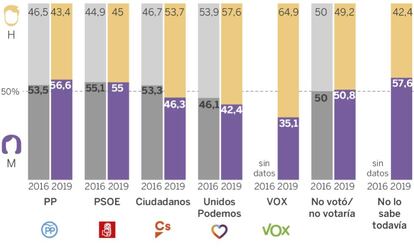With elections looming, Spanish poll shows 60% of undecided voters are female
Four million women have yet to decide who to vote for in April and May, and parties are scrambling to attract their attention

A new opinion poll to gauge voting intention in Spain shows that women are more undecided than men about their choices for the April 28 and May 26 elections, when Spaniards will elect new local, regional, national and European leaders.
The latest poll by the Center for Sociology Studies (CIS) also shows that women are less likely to vote for the new parties – Podemos, Ciudadanos (Citizens) and Vox – and more for the two traditional groups, the Socialist Party (PSOE) and the Popular Party (PP).
The Pedro Sánchez government has presented itself as the most feminist in Spanish history
The survey, which was conducted in January, shows that of all the respondents who said they still didn’t know who to vote for, nearly 60% – around four million voters – were women.
This could explain why political campaigning has been focusing on women: the PP is suggesting a national pact on the salary gap, while Ciudadanos has come up with a “liberal feminist manifesto” that includes regulatory measures for prostitution and surrogacy. Meanwhile, the Unidos Podemos coalition, made up of the United Left and the anti-austerity Podemos, has changed its name to the more feminine-sounding Unidas Podemos.
Although the PP does not embrace feminism (it does not see the need for a collective movement to fight for women’s rights), it is the Spanish party with the highest number of female voters, followed closely by the PSOE. The CIS poll shows that 57% of respondents who said they will vote for the PP are women. That figure was 55% for the Socialists.
The poll shows that women are less likely to vote for new political parties
The Pedro Sánchez government has presented itself as the most feminist in Spanish history because the Socialist prime minister appointed the highest number of women ministers of any Cabinet in the world when he took office in June 2018. And the PSOE has another added advantage: in Spain, as in neighboring countries, “women are more likely to vote for social-democratic parties,” writes Gema García Albacete, who teaches political science at Carlos III University, in an article for EL PAÍS.
But the PSOE’s real strength resides in female voters who are 65 and older. Of these, one out of three said they would vote for Pedro Sánchez. The party’s challenge now is to tap into a younger female voter base, and the opportunities abound: one out of every four women under 35 said that they are still undecided, and this group has been shown to be especially sensitive to equal-rights issues.
Among the new parties, Podemos does not seem to be attracting more women voters despite the fact that it is viewed as pro-feminism. The poll shows that 57.6% of Unidos Podemos voters are men.
Meanwhile, Ciudadanos has more female than male voters, but has still lost seven percentage points in female support from the last election in 2016. And then there is Vox, a far-right party that makes a point of fighting feminism and which is backed mostly by men: 65% compared with 35% of women voters.
English version by Susana Urra.
Tu suscripción se está usando en otro dispositivo
¿Quieres añadir otro usuario a tu suscripción?
Si continúas leyendo en este dispositivo, no se podrá leer en el otro.
FlechaTu suscripción se está usando en otro dispositivo y solo puedes acceder a EL PAÍS desde un dispositivo a la vez.
Si quieres compartir tu cuenta, cambia tu suscripción a la modalidad Premium, así podrás añadir otro usuario. Cada uno accederá con su propia cuenta de email, lo que os permitirá personalizar vuestra experiencia en EL PAÍS.
¿Tienes una suscripción de empresa? Accede aquí para contratar más cuentas.
En el caso de no saber quién está usando tu cuenta, te recomendamos cambiar tu contraseña aquí.
Si decides continuar compartiendo tu cuenta, este mensaje se mostrará en tu dispositivo y en el de la otra persona que está usando tu cuenta de forma indefinida, afectando a tu experiencia de lectura. Puedes consultar aquí los términos y condiciones de la suscripción digital.








































